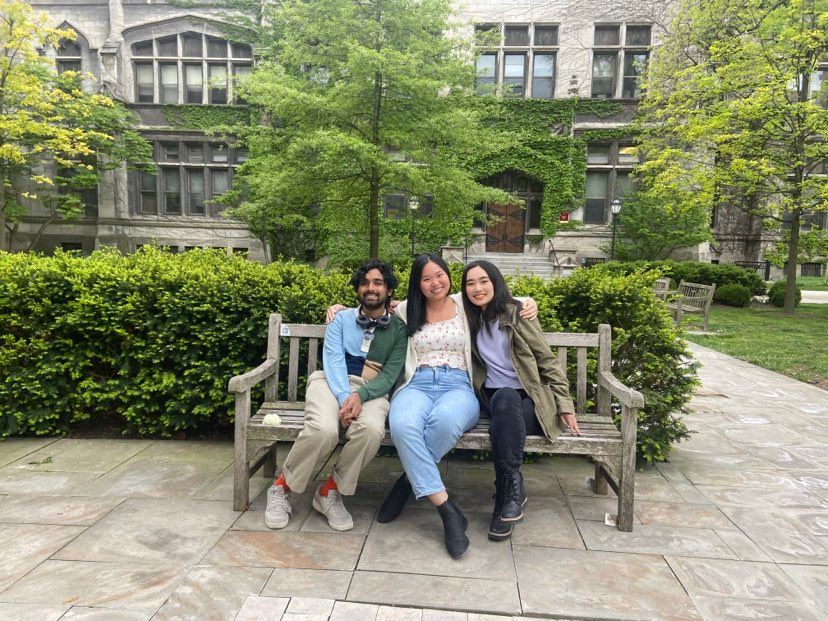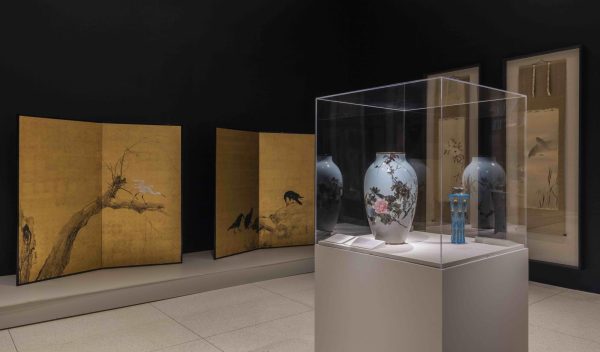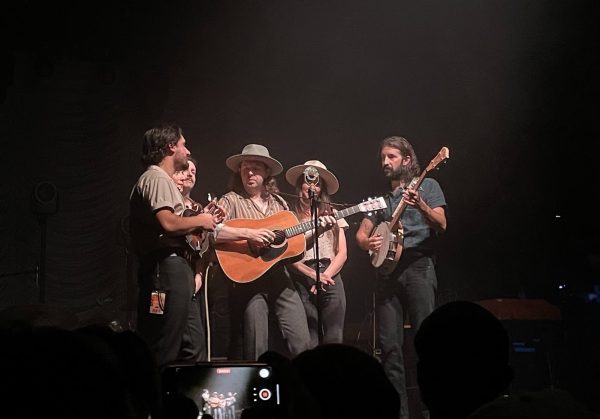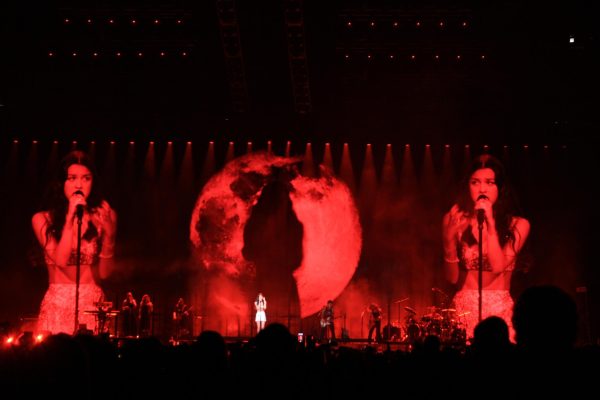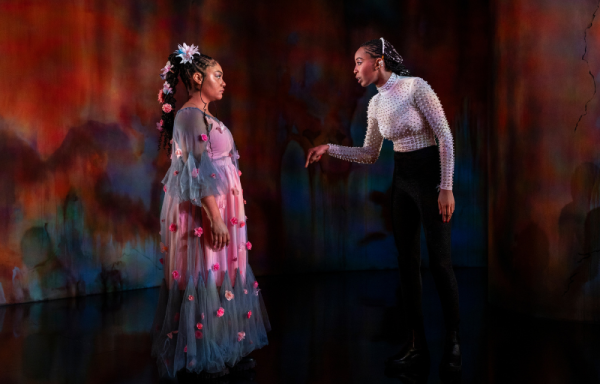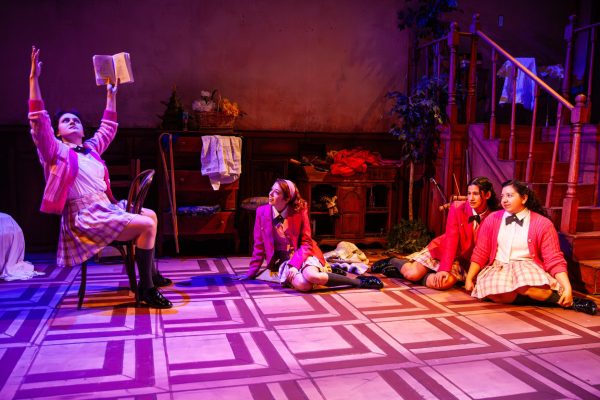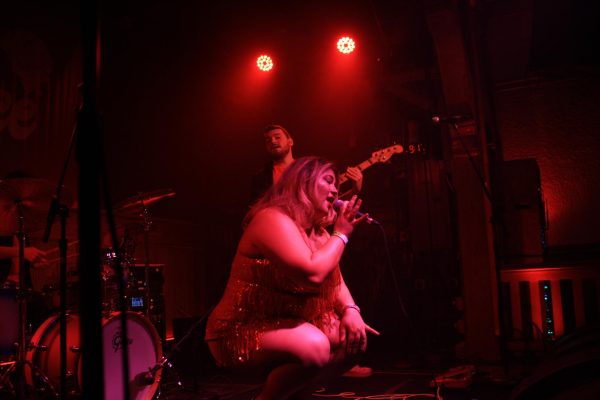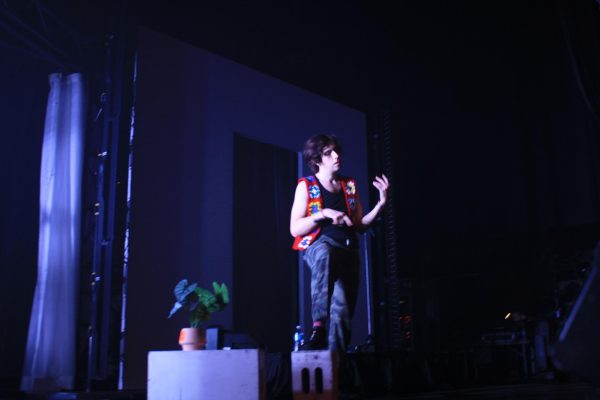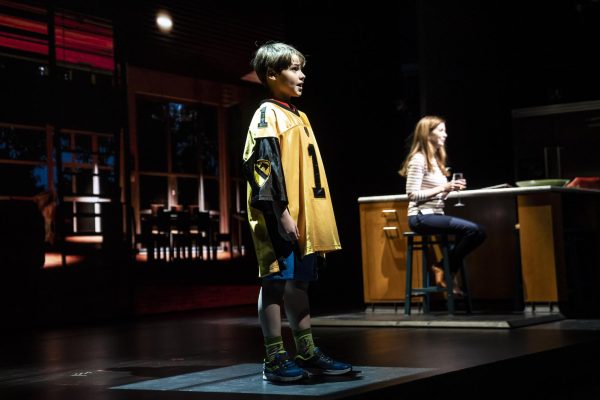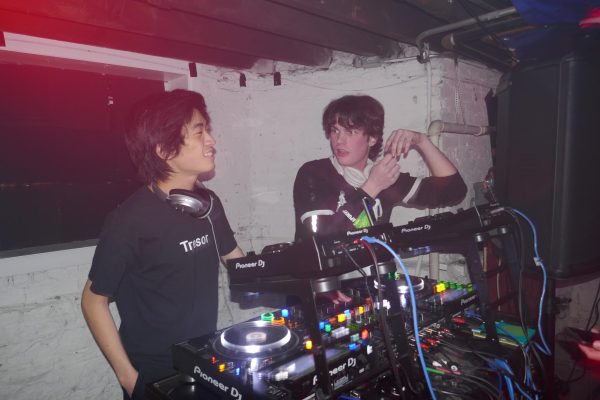Ye Olden Maroon Voices: With Love, the Former Arts Eds
Former Arts editors Wahid Al Mamun, Veronica Chang, and Alina Kim reflect on their time with “The Maroon.”
Pictured (left to right): Wahid, Veronica, Alina
June 6, 2022
At 4 a.m. (SST), we shouldered the tedium of removing every extra asterisk from the edited drafts of to-be published articles; when the margins of our InDesign spreadsheets threatened to knock texts off the page limits, though, we shuffled over hopelessly to the design team.
Such was the life of us three (former) Arts editors in the spring quarter of 2020. Two of us were bullshitting R commands for the same class (shoutout to (some of) the stats department), and the third diligently attended Zoom class at 3 a.m. from his childhood bedroom in Singapore. Between reminiscing over the Ida Noyes basement and writing pitch emails while restaurants, museums, and theaters canceled all their events (and by translation, almost all possible pitches), we found leading this Maroon section an introspective space where we journalists could reflect on what our little hub in the world of arts is capable of. We oversaw our beloved team covering new queer media, following the Oscars, and exploring pop music, all as a means of cultural protest and praise.
From 2019 to 2021, Arts has taught us to embrace the unhinged: in pitching, writing, editing, publishing, tweeting, and more. We sat down with, well, each other to talk about our time as Maroon editors, our favorite artsy pastimes and academic highlights, and—signature to the Maroon Arts editor application—our hottest takes. Take our final article as a love letter to the section, from past editors who trained us to veteran reporters with your inspiring pitches and stories to future UChicago arts journalists who will continue on our mission to take over the entire newspaper. (Just kidding on that last part. But not really.)
Note: The recording of this interview lasted almost two hours, and included Wordle breaks, furry allegations, and tangents about all the articles we said we would write but never did (apologies to our new leadership, Yiwen and Gage). All of which we’ve since cut out.
Chicago Maroon (CM): We served as editors together for years—Wahid and Alina since the winter quarter of 2019, and Veronica joining us in the spring quarter of 2020. Among the dozens of articles that have come our way, which ones were your all-time favorites?
Alina Kim (AK): I think it was either [my] first or second year. [Adam Chan] went to Gorée Cuisine with their friends and tried every single thing on their menu. I’m proud of that one because I wrote the headline for [it], but also, that article inspired me to go to the restaurant and try their tilapia. I also really liked editing Wahid’s article about disgusting American food—he has a hatred for string cheese.
Wahid Al Mamun (WAM): Alina’s Beastars article, 100 percent. You’ve never beaten the furry allegations since. I also really liked Kayla [Martinez’s] articles during COVID, especially the one about The L Word. We were in the midst of a hard pivot in our coverage to reflective think-pieces because of the pandemic, and Kayla’s articles were the ones that really made me go, “Wow, this pivot could actually work.”
Veronica Chang (VC): Evan [Williams’s] article on Medici’s tomato slice. I’m a huge fan of everything Evan has written for us–the hilarious and the heartfelt–but this one started it all: a $1 tomato slice. Also Neel [Lahiri’s] film reviews. His Nomadland one especially stuck with me for a while, and I always look forward to his Oscars opinions. Extra shoutout to Neel for tolerating all of our “no facts, just vibes” Oscars tweets.
CM: The section went through some rapid changes, leadership and content-wise, after Wahid took charge as the Head Editor in spring 2020, and Alina and Veronica as the Deputy Editors. What were some of your favorite changes made to the Arts section?
VC: Probably the variety of pitches we’ve had. Like Wahid mentioned, we made a hard pivot because of the pandemic to more reflective and personal pieces, but we’ve also had articles that have dealt with less deep or substantive material–we did a list of our favorite holiday movies for Christmas–and those articles have been hilarious to write and edit. And I think that variety is what makes Arts as a section so fun, that you don’t have to feel self-conscious about what you’re pitching or submitting. You don’t have to worry if something is too weird or improper or anything like that. We were responsible for introducing a lot of chaos to Arts–you could argue for better or for worse, but I’m going to say it’s for the better.
AK: Ditto. We also made pitch emails that had their own headlines or puns to attract more writers, instead of directly saying “We need a reporter for X. Respond to Y.” I was flattered when Jad [Dahshan], a former editor, told us they enjoyed reading our pitch messages—and even more flattered when new reporters started hopping in with wilder pitches of their own to match that energy. [Former Arts editor] Gabi Garcia once reached out to me to co-write a review on Ratatouille: The TikTok Musical, which may or may not have started the transition into my Theater Kid era.
CM: Our experience with the arts was not confined to the newspaper. What was the most artsy activity you’ve done on campus?
VC: One of my creative writing classes, which was a nonfiction workshop on the performative essay. The class really cemented to me that nonfiction was not just very traditional longform essays, that you could expand nonfiction into more experimental things, like poetry or performance or autofiction–any sort of genre as long as you just say, “This is nonfiction.” So shoutout Dina Peone, who taught that class and was instrumental in shaping my conception of what nonfiction could be.
WAM: Two things–during COVID spring some of us put together UChiPoWriMo, where UChicago students wrote one poem a day in the month of April. Amid the COVID chaos and having to uproot myself and go back home to Singapore, it was really fun to come up with different prompts and to see different people’s poems. It even got some uptake from the Creative Writing department, which was cool. A more recent thing is The Babble, which a couple of my friends and I have been working on for a while now as we were writing our Anthro theses. We wanted to come up with our own undergrad academic journal for zany, interdisciplinary stuff. So, if you have thesis excerpts or weird essays you wrote for class or a cool photo series, we’d love to take a look at them.
AK: I was a projectionist for Doc Films for a couple years. I’ve always wanted to work in a movie theater just to see what happens behind the scenes. I got to train under Laura Hicks for most of the time. We worked a lot with 35 mm and it was really fun just to be able to screen classic movies like The Shining. I love behind-the-scenes tasks—my job is tech crew work at Mandel Hall—and to share my love for cinema by making the magic happen in the booth was something I never thought I’d do and have loved doing.
CM: Pivoting to academia, we all wrote about media for our theses and portfolios. What were your senior projects about?
AK: My political science thesis is in an extremely boring field, arguably. Congressional hearings. Haha. So, I’ll talk about my media arts and design capstone project instead.
I wrote a thesis about how players can find the meaning of death within deathless systems in puzzle video games. And the framework that I used was from Wii Sports because one of the Miis, Matt, has two features. Matt has two aspects of difficulty: the mechanical and affective. Mechanical difficulty is how hard it is to beat that avatar. He’s the Wii Boxing champion, and he can punch you so hard that you feel your Wii remote shake. You might get a horrified reaction from seeing your Mii get knocked down to the ground. “Oh my God, I dropped a hundred levels. I have to face lower-leveled Miis again before going back to Matt.” Combine that with affective difficulty, which I feel is this strange cult following Matt has, where people think of him as someone to be beaten. In that process, we come to desire our own defeat because of his cult status as a Final Boss. Because so many people have shared an experience of getting destroyed by Matt, we have this collective nostalgic desire to be punched by him again and again. That’s why people were excited to see the possibility of Matt returning to Nintendo Switch Sports.
So, I’ve looked at other deathless systems in games like Monument Valley, a puzzle game. You’re supposed to solve mini-illusion puzzles that are already “broken” until your avatar, a princess, can pass the level. The player navigates Monument Valley’s puzzles and learns that the princess avatar they control has directly led to the genocide of humanity. Yes, you’re fixing broken pieces mechanically, but also you’re fixing something affectively in the narrative that you, the princess, broke in the past.
WAM: I wrote an Anthro thesis about the discursive construction of migrant worker mental health in Singapore and ended up making an argument about how migrant workers turned to art spaces as affective sites of interruption to stake belonging in Singapore. More broadly, how affect can be a powerful organizing tool for migrant workers. I also did the poetry portfolio for the Creative Writing minor–I wrote a bunch of poems about the compulsive act of writing poetry, and how poetry both reenacts and processes something traumatic.
VC: Preface that I’m a STEM major (the E in STEM stands for Econ, and the S stands for Statistics)—I’m still trying to comprehend how you guys wrote 80+ page theses and did minor portfolios/projects. I worked on a data science project that looked at classifying and predicting removed comments on Reddit, and how natural language processing models could help with that. I’m also a Creative Writing minor, so I completed a nonfiction portfolio–I wrote two essays about my family–my maternal grandma and my mom–and Hong Kong, and about writing and editing those two essays, like how struggling to write an essay is an essay in itself.
CM: Was there anything strange, arts-wise, that you ran into as students in the humanities?
WAM: Probably the one I’m taking with Malynne Sternstein right now, [Anxious Spaces]–she’s a wacky lecturer, and she switches from self-Lacan to self-deprecatory jokes to continuity ‘errors’ in The Shining. It’s kind of a bunch of work with theoretical readings, but it’s all wild stuff, and there’s a really solid film syllabus too. Also, my final is to design a literal anxious space–I have to draw it out though, so I’m kind of worried because I can’t do that. But it’s the most UChicago class I’ve taken–it’s up to the reader to decide if that’s derogatory or not.
AK: I’m in a class called Video Game Music Production with a teacher who calls themselves Sensei Shallow, but their name is Takashi Shallow. They embody the anxious millennial whose work actually sounds legit. They’re currently teaching us how to make lo-fi, square, and ambient video game music and sound design scores. I’m not a composer, but they taught me how to make unhinged, glitchy electronic music, which I’ll use to compose a horror soundscape.
VC: I initially gave three answers that were all STEM-related. In my defense, you guys asked for my most unhinged class and no one matches the Stats department in neutral chaotic energy. But aside from that, I’m taking a class on filth as a genre–shout-out Beatrice Bradley in the English department–which looks at compiling a sort of canon of filth across different time periods and mediums, across both so-called high and low-culture stuff. We’ve done old Latin poetry and Jane Eyre, looked at Fifty Shades of Black as a parody of Fifty Shades of Grey as a transformative work of Twilight, and I just turned in a paper that started with “Unlike Stephenie Meyer’s initial conception of Twilight, the word ‘virgin’ did not come to me in a dream.”
CM: It would be blasphemous to have led the Arts section without consuming arts media ourselves. What are you currently reading and watching for fun?
AK: I started the She-Ra and the Princesses of Power remake, created and produced by ND Stevenson, in autumn quarter 2020 and never got around to finishing the final season. I think Maroon reporters recommended that show to me, actually! I’ve reached episode four now, though, so almost done. As for reading, I discovered a book on BookTube called The Atlas Six by Olivie Blake, a dark academia fantasy of sorts.
WAM: I’m reading and watching very sophisticated things at the moment. I’ve been watching The Ultimatum, and I think someone on Twitter called it “cishet nonmonogamous monogamy,” which is very accurate. I’m also reading Twilight and Fifty Shades of Grey for class–[the filth class]–and I greatly prefer the former to the latter. For fun, I’m planning to read Trouillot Remixed (ed. Yarimar Bonilla, Greg Beckett, Mayanthi L. Fernando), which I picked up on a discount from the Sem Co-op. It’s funny, because I guess most people would switch the fun and required readings around, but you know–typical UChicago!
VC: Same class as Wahid, so I’m also reading Twilight and Fifty Shades of Grey. I’m enjoying both, so I also tried reading Midnight Sun, which I surprisingly did not enjoy. For fun, I’m reading Severance by Ling Ma–I love the way Ma plays with chronology and nostalgia. I’m watching Attack on Titan and Spy x Family, both of which, now that I’m thinking about it, deal with the aftereffects of war in very different ways. I’m also rewatching episodes of Doctor Who, Crime Scene, and Haikyuu!!.
CM: The application to become Maroon Arts editors always features a signature section: Give us your hottest arts-related take. Ironically, as the editors who wrote that into the Google form, we actually never answered this ourselves. So, give us your hottest arts-related take.
AK: We have not yet had an iconic film theme since Pirates of the Caribbean (2003). Sure, we’ve heard How to Train Your Dragon’s “Test Drive,” Inception has “Time,” and The Batman spams that brass-heavy leitmotif and whatnot, but none of the 2010-era films reached the level of fame and universal recognition as Pirates did.
WAM: Mine’s about books–I think the ‘disaffected white woman’ genre is swiftly coming to an end. It has produced some bangers and I love them all: My Year of Rest and Relaxation by Ottessa Moshfegh, which is the template, Normal People by Sally Rooney, The New Me by Halle Butler, even Severance, to an extent. But it’s jumping the shark, and I think you can really see that with Faber and Faber’s insane publicity stunts for the new Sally Rooney book (Beautiful World, Where Are You) last year. We get it–you’re depressed, your job is BS, you have subpar sex, and you have a ton of privilege-induced guilt. It’s been a great run, and I will be excited by whatever Rooney puts out next, but I can’t wait to move on.
VC: I keep changing my mind on which hot take to include here. The one I originally had, Alina reacted by saying, “That’s a hot take.” Which I guess is a take in itself, because the echo chamber of mass opinion implies that the justification of a hot take matters less than its unconventionality. Anyway, Legally Blonde The Musical is in every way superior to Legally Blonde The Movie.
CM: What advice do you have for future Maroon Arts reporters?
WAM, VC, and AK: Write about what your heart desires. We’ve seen articles on virtual theater on campus, we’ve seen rants about fan backlash to video game masterpieces, Wahid wrote about the Bad Art Friend. If you see something in the pitch list that you think is missing, just shoot a note to the editors with a pitch of your own—we can’t wait to read your unhinged hot takes!
WITH LOVE, ALWAYS AND FOREVER,
~YOUR FORMER HEAD ARTS EDS
Editor’s note, August 20, 2023: A parenthetical from a previous version of this article was removed for clarity.



